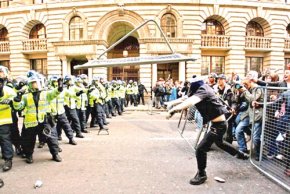Summit of the G20: Repression against the demonstrations claims its first fatality
07/04/2009 La Verdad Obrera N° 319 / International

London, one of the most symbolic cities of capitalism, lost its customary appearance for a day. Businesses chose to display the "closed" sign, and the employees of the City changed their suits for casual attire amidst big demonstrations one day before the beginning of the G20 Summit. Thousands of activists from the whole country, organized in four marches headed by giant puppets representing the "Four Horsemen of the Apocalypse," seized the financial center of London on Wednesday, April 1, to protest against the crisis, bankers, the greed of the financial sector and capitalism. The main banner of one of the marches said, "Capitalism isn’t working." Along the protest, one could read signs with slogans like "Death to capitalism," "It’s time for a better world," and "Troops out of Iraq!"
For several weeks the City has had strong security measures. Thousands of riot police were trying to intimidate the demonstrators, mainly young people. Once again, the police used the same tactics employed during the protests by the anti-globalization movement, their famous “containment tactics”, " penning protesters”, so called "kettle", using horses and shields. After several hours of being "kidnapped" on the street, without water or access to toilets, the demonstrators began to shout, "Get us out of here", while they were throwing plastic bottles and rolls of toilet paper at the police. Such was the pressure by the forces of order that one demonstrator died as a result of suffocation.
One of the targets of the protest was the Royal Bank of Scotland (RBS), a focus of attention because of the retirement agreement of its chief executive for 703,000 pounds sterling (around one million dollars), that triggered great anger among the people. The demonstrators broke the windows of the RBS and entered the building.
Around 5,000 activists gathered in front of the US Embassy in London to express their opposition to the war and US policy in the Middle East. The march was called by the Stop the War Coalition, and there were banners of the Campaign for Nuclear Disarmament and the Palestine Solidarity Campaign, among others. There were trade unionists, anticapitalist organisations, ecologists, pacifists and antiwar activists. Students from several British universities that have been carrying out occupations of their buildings in solidarity with the people of Gaza participated in the demonstration to say: "World leaders spend billions on wars when it would be better to use that money to end hunger and poverty in the world." This was not the first protest against the G-20 summit. On Saturday, March 28, almost 50,000 people, with a lot of rank and file trade union delegations, took the streets with the slogan; "Put people first" to express their anger at the policy of Gordon Brown’s government of bailing out banks while neglecting basic needs like health care and education. In an atmosphere where many people have lost their homes and their jobs, occupations in some economic sectors are beginning to be seen as a defensive way of keeping jobs, like the occupation of a Visteon [auto parts] plant in Northen Ireland or the recently ended occupation of the Waterford Crystal factory in the Republic of Ireland. Unlike the demonstrations of the anti-globalization movement and the massive marches against the war in 2003, these new mobilizations against the bankers, making the point that "capitalism isn’t working" are taking place in the context of a capitalist crisis not seen in decades, the consequences of which millions of workers are beginning to pay for with unemployment and the dismantling of public services. The development of these mobilizations could begin to show a change in the mood of the masses in one of the big imperialist powers.







